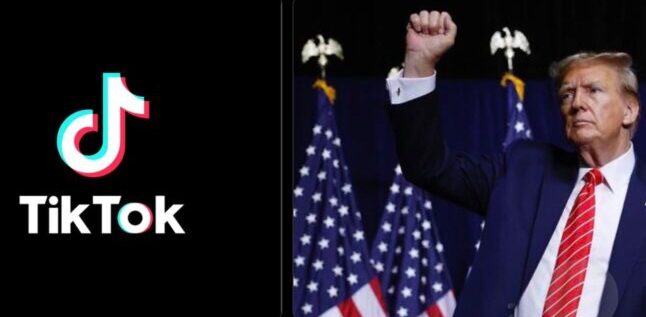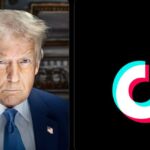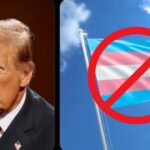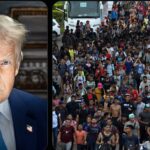President Trump says he would like the US to have a “50% ownership position” in TikTok in order to prevent it from being banned again
In a bold move that has once again drawn attention to the future of TikTok in the United States, former President Donald Trump has expressed a desire for the U.S. government to have a “50% ownership position” in the popular social media app. This statement comes amid ongoing debates about national security concerns related to TikTok’s Chinese ownership and its potential impact on American users. Trump’s proposal seeks to prevent the app from facing another ban and to ensure that U.S. interests are fully protected in the app’s operation. His remarks add another layer to the already complicated situation surrounding TikTok’s status in the U.S., which has been a point of contention for both political and security reasons.
TikTok, owned by the Chinese company ByteDance, has been under intense scrutiny from U.S. lawmakers and national security agencies for its data collection practices. There have been concerns that the Chinese government could access user data through TikTok, potentially posing a risk to national security. These issues led to the Trump administration’s efforts to force a sale of the app’s U.S. operations, a move that has since been embroiled in legal battles and uncertainty. Now, with Trump’s new statement, the conversation around TikTok is set to intensify once more.
Understanding the Context of TikTok’s Controversy in the U.S.
The debate over TikTok’s presence in the U.S. dates back to 2020, when former President Trump issued an executive order to ban the app, citing national security concerns. The U.S. government argued that TikTok’s data collection methods were potentially a vehicle for the Chinese government to access sensitive information about American citizens. This fear led to a proposal for a forced sale of TikTok’s U.S. operations to an American company, which would ostensibly make the app safer from foreign influence.
In response to the potential ban, TikTok has repeatedly denied any wrongdoing, asserting that it stores U.S. user data within the country and operates independently of the Chinese government. However, the Trump administration remained firm in its stance, pushing for a sale or a complete shutdown of TikTok’s operations in the U.S. After a series of legal challenges and ongoing negotiations, the issue was put on hold by the courts.
Now, Trump’s suggestion to involve the U.S. government directly in the ownership of TikTok signals that he still believes the app could pose a threat without American oversight. His proposal to secure a “50% ownership position” for the U.S. suggests that he views the solution as a way to maintain TikTok’s operations in the U.S. while ensuring that national security concerns are addressed.
What Does Trump’s Proposal Mean for TikTok’s Future?
Trump’s proposal to have the U.S. government hold a 50% stake in TikTok is a highly unusual and unprecedented suggestion. Typically, foreign-owned companies are allowed to operate in the U.S. without direct government ownership, and government interference in private businesses is rare. However, Trump has consistently taken an unconventional approach to foreign policy and national security matters, and this latest proposal is no exception.
By suggesting a 50% stake for the U.S., Trump is implying that American interests should have a direct say in the app’s operations. This would likely involve the U.S. having a level of control over the company’s decision-making processes, especially when it comes to data privacy and security. For many, the proposal raises a series of questions, including how such an arrangement could work in practice, and whether it could be feasible legally or economically.
If the U.S. were to take a 50% ownership position in TikTok, it could create a more balanced partnership between the Chinese parent company ByteDance and the U.S. government. This could help address national security concerns, as the U.S. would have a direct role in overseeing how data is handled and how the app operates within U.S. borders. However, it would also likely be met with resistance from both ByteDance and U.S. tech companies, as it could set a precedent for greater government intervention in the private sector.
Potential Legal and Political Challenges
Trump’s proposal for a 50% ownership stake in TikTok is bound to face several legal and political challenges. First and foremost, such a move would likely require significant legal changes to U.S. corporate law, as well as an agreement from ByteDance to relinquish a portion of its control over the app. ByteDance may be unwilling to cede such power to the U.S. government, particularly given that it would significantly alter the structure of the company.
Moreover, this proposal could set a troubling precedent for future foreign-owned companies operating in the U.S. If the government were to gain partial ownership of a major international app like TikTok, it could spark concerns about the overreach of government powers into private businesses. This could create uncertainty in the global tech market, as companies may be wary of entering the U.S. market if they fear similar government interventions.
Politically, Trump’s proposal would likely face pushback from both Democrats and Republicans. Many lawmakers have expressed concerns about the app’s data privacy practices, but the idea of government ownership of a private company is a controversial one. It is unclear how bipartisan support for such a proposal would be achieved, especially considering the growing tension between the U.S. and China on trade and technology issues.
TikTok’s Position in the U.S. Market
Despite the controversy surrounding its ownership, TikTok has continued to thrive in the U.S. market. With millions of American users and a powerful presence in the entertainment, business, and influencer space, TikTok has become an integral part of the digital landscape. Its unique algorithm and viral content model have revolutionized social media, making it an attractive platform for both creators and advertisers.
However, the potential for a ban or forced sale remains a constant threat hanging over TikTok. While the Biden administration has not expressed a strong desire to pursue a complete ban of the app, national security concerns regarding foreign influence and data privacy continue to be relevant topics. Whether or not Trump’s suggestion for a 50% ownership stake gains traction, the future of TikTok in the U.S. is still uncertain, and its continued operation will likely depend on future regulatory decisions.
The Broader Implications of U.S. Ownership in Foreign Tech Companies
Trump’s proposal could also have broader implications for the U.S. government’s role in foreign-owned tech companies. If the U.S. were to take a significant ownership stake in TikTok, it could open the door to similar actions with other foreign technology companies operating in the U.S. This could fundamentally alter the way the U.S. handles foreign investment in the tech sector, especially as concerns about cybersecurity, espionage, and data privacy continue to grow.
On the other hand, such a move could be seen as a protective measure to ensure that the U.S. has control over critical technologies in an increasingly competitive global market. As countries like China and Russia continue to develop their own tech sectors and digital infrastructure, the U.S. may feel that it needs to take more proactive steps to safeguard its interests.
In Conclusion
Donald Trump’s proposal for the U.S. to take a “50% ownership position” in TikTok in order to prevent its ban once again places the app in the spotlight of national security and political debate. While the proposal is unconventional, it reflects the ongoing concerns about foreign influence in American digital spaces.
Whether such a solution is realistic or legally viable remains to be seen, but it highlights the complex dynamics between the U.S. and global tech companies, particularly those with ties to China. As the situation continues to unfold, it’s clear that TikTok’s future in the U.S. will remain a key issue in the intersection of technology, geopolitics, and national security.

















Post Comment